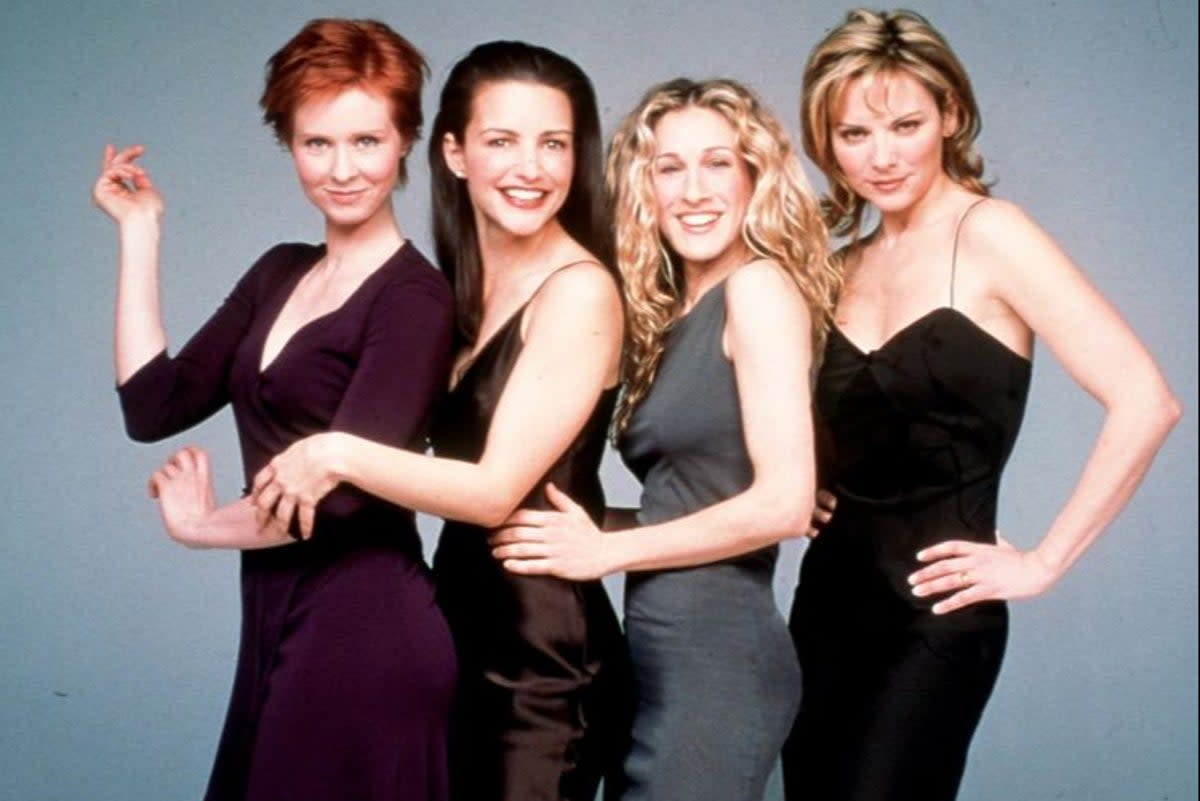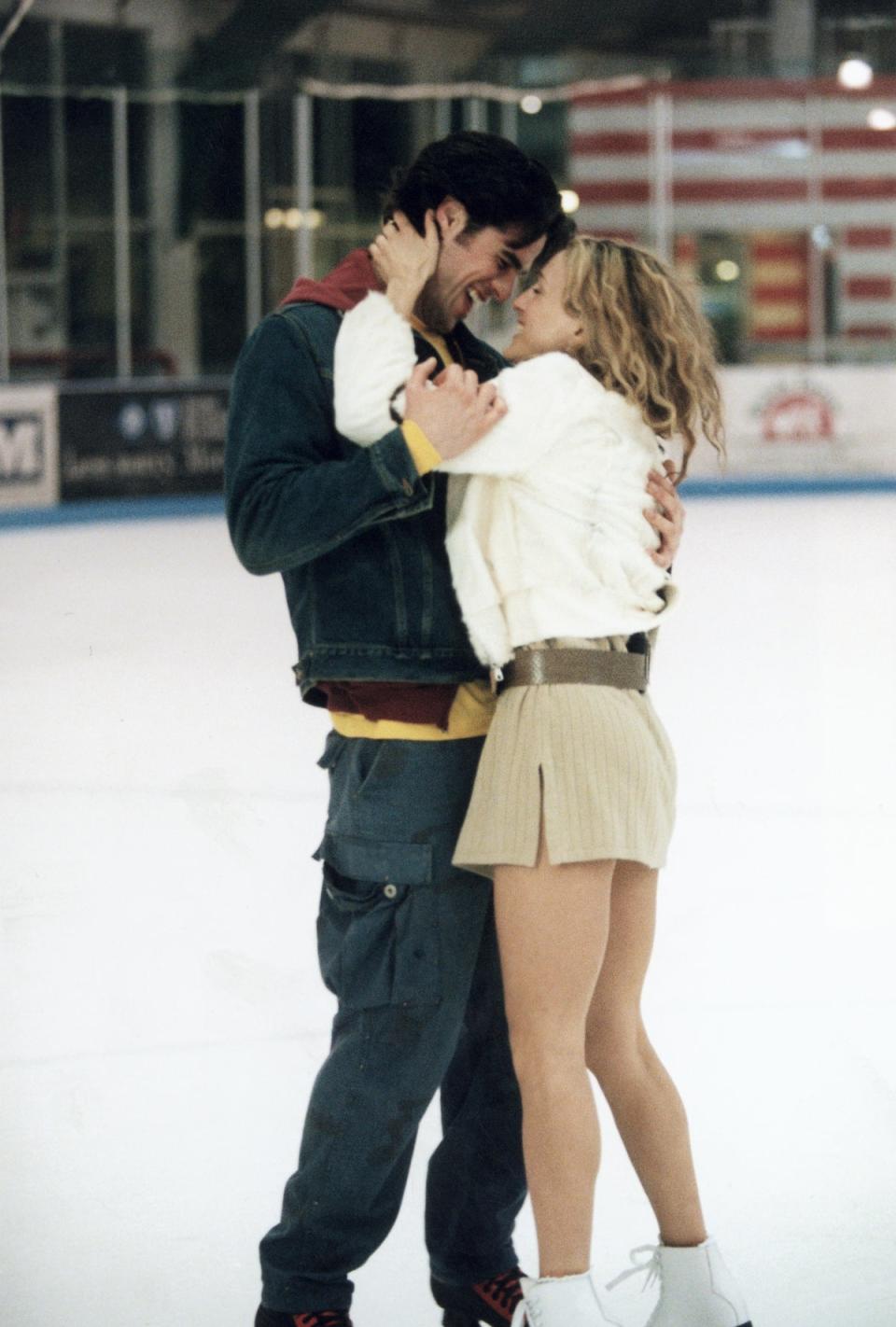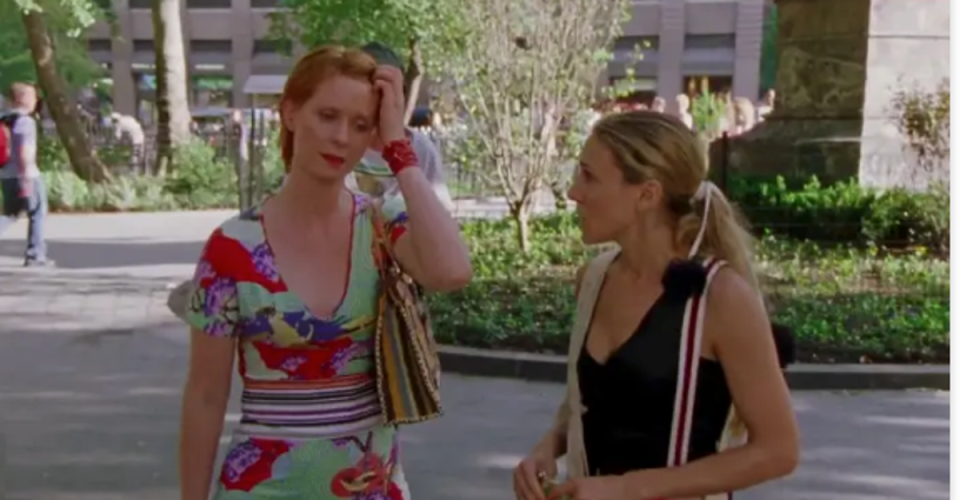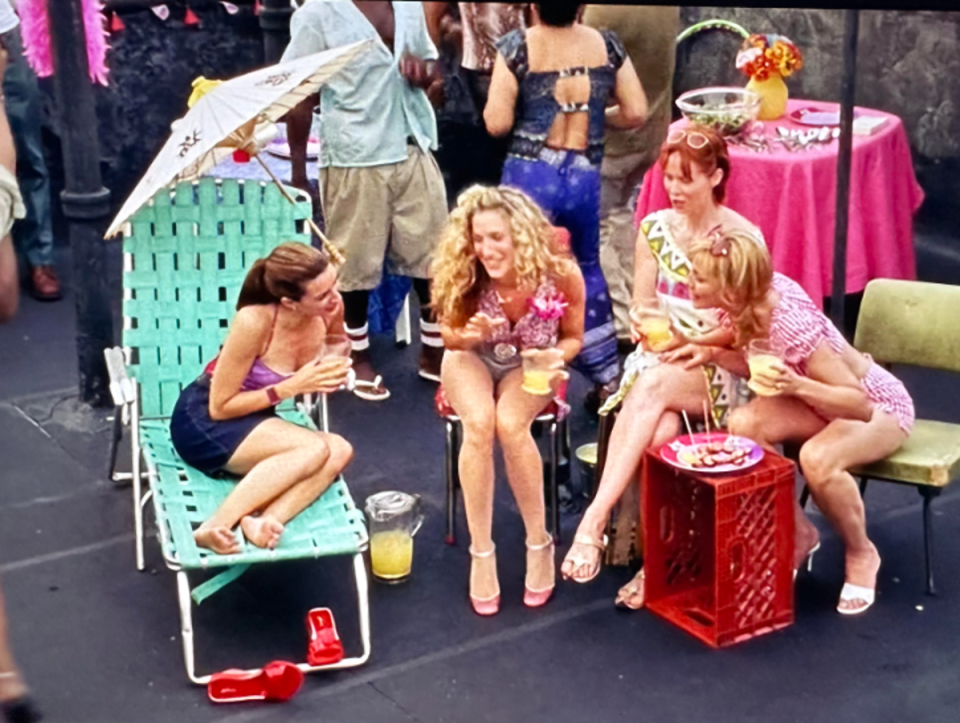I’m Gen Z watching Sex and the City for the first time. It’s not just outdated, it’s cringey

- Oops!Something went wrong.Please try again later.
When Sex and the City aired in 1998, my parents weren’t married yet. When the show ended in 2004, I was three years old.
Now, I’m 22 years old and watching SATC for the first time.
Like Carrie Bradshaw, I’m a writer living in New York City – but that’s where the similarities end.
Much has been made of what my generation would make of the outdatedness of storylines such as Carrie Bradshaw dismissing bisexuality as “a layover to gaytown”. Or sex-fiend Samantha Jones’s altercation with her “friendly neighbourhood pre-op transsexual hookers,” described as “half man, half woman, totally annoying”.
The arrival of Sex and the City – an HBO production based on journalist Candace Bushnell’s column, and book by the same name – on Netflix opens it up to a wider global audience. But, the show has been available on the Max streaming platform since it launched in 2020, and on HBO before that, so it’s not like this is Gen Z’s first exposure to the series - and we are more than capable of handling the issues it tackles without bursting into flames.
I won’t pretend to speak for an entire generation but as a Gen Zer and SATC virgin, I can tell you after watching a handful of episodes, I’m not a fan.
My problem isn’t that the show is outdated, it’s that it’s almost unbearably cringey and centres around characters who are, quite frankly, awful people – and awful friends.
It’s not that I wasn’t aware of the show. I grew up scrolling through cable and seeing the constant SATC reruns, but I was never allowed to watch it. The sexcapades of four 30-something women marauding around Manhattan was, according to my mom, “too inappropriate”. Fair enough. But since making the move to New York City for a writing job, I’ve told many jokes about “being in my Carrie Bradshaw era” while having barely any idea who she is.
Now I’ve seen the show, it’s clear that I’m not in any kind of Carrie Bradshaw era.
First of all, I live in South Brooklyn, a 50-minute commute from the office, not in a Carrie-approved Upper East Side brownstone. I’m not constantly brunching or dining or sipping “cosmos” at bars with my friends. Who can afford to eat out that often? As far as dating goes, I often hear about my friends’ dating woes so I guess we do have that in common, but they rarely relate to such a constantly changing cast of partners as the SATC women.
I’m also part of a generation where it isn’t uncommon to have one of your close friends identify as a different sexual orientation. My peers and I were very young when gay marriage was legalised in the US in 2015. As a result, one of my biggest issues with the show is self-proclaimed “sex columnist” Carrie, who was supposed to be pushing the boundaries of our opinions on sex but came across as strangely proper towards something that is so normalised today.

When Carrie briefly dates a bisexual man named Sean, each of the other three main characters offer up extremely outdated views on the subject of his sexuality. Charlotte claims that bisexual men are taking away all of the single men in New York City; Miranda calls it “greedy double-dipping”; and the sex-positive Samantha goes on to call herself a “try-sexual” who tries everything once.
A bisexual isn’t someone who’s “confused”. Bisexuality is a very real sexual orientation.
Another defining moment for my generation was when the US Supreme Court overturned the court case Roe v Wade on 24 June 2022, declaring that the constitutional right to abortion, upheld for nearly a half century, no longer exists. In the show, there is an entire episode that I would argue pushes the envelope in terms of portraying abortion on television.
In season four, Miranda accidentally becomes pregnant with her ex-boyfriend Steve’s baby and immediately makes the decision to have an abortion. She tells her friends, prompting Samantha and Carrie to reveal they too have had abortions.

My problem comes when Charlotte, who has been told she has a small chance of conceiving naturally, leverages that information and guilts Miranda.
By the time Miranda’s appointment for the procedure rolls around, she makes the decision to keep the baby. Although the episode initially approached the topic directly and transparently, Miranda’s decision to not get an abortion seemed to be born of societal pressure, amid an ongoing theme of her feeling as if she wasn’t the ideal woman.
Abortion should be an option for all women. I would’ve had so much respect for the episode had Miranda stayed true and solidified in the choice she made at the beginning.
Then there are the plot lines that are just cringey and uncomfortable to watch. In season three, Samantha dates a Black record producer and gets into a fight with his sister, who doesn’t approve of him dating a white woman.
Samantha resorts to hurtling insults at her partner’s sister. Is this how anyone would actually act in real life? Of course not.
Later in the season, hot-headed Samantha gets annoyed with the trans sex workers making noise outside the window of her Meatpacking District apartment in the middle of the night. The episode, which now stands out as one of the most tone-deaf of the series, sees her use a derogatory slur more than once to describe them, and later throw a bucket of water on them.
Perhaps it was a sign of the times, but neither of these storylines hold up today.

As for the show as a whole, I was left with the overwhelming feeling that there’s such a lack of redeemable qualities in the main characters; I wonder how they’re even friends at all.
I know I’m not the only person in the world to hate Carrie. She creates needless drama for herself, blames other people, then asks her friends for support - and never seems to evolve beyond this toxic pattern. After just a few episodes, I found myself resenting the show for asking me to sympathise with her perspective.
Samantha is obnoxious and comes across as having few morals. She says her life goal is to “have sex like a man” but that doesn’t excuse some of her predatory actions. Would anybody excuse a person who grabbed a masseuse’s genitals after hearing on the grapevine that they give “happy endings”?
Miranda seems compelled to find the negative in everything. She can’t let anyone, including her friends, be happy with their choices. Sometimes it’s warranted (her advice to Carrie not to let Mr Big back into her life is spot-on) but I found the constant negativity draining to watch.
I liked Charlotte at first, especially in season one when she’s strong-willed in what sexual acts she will and won’t do after her casual fling attempts to push her into oral sex. But she turned out to be the worst. She’s selfish, superficial and overall a terrible character. Over the six seasons, she did very little maturing. Instead of learning from her experiences, she whined, repeatedly made the same mistake of setting unrealistic expectations for the men she was dating, and then somehow finding they were in the wrong when they didn’t morph into her dream man.
Unlike Friends or The Office, which have their own problems when watched through a modern lens, there is not a single main character worth rooting for in Sex and the City. The bottom line is I can’t enjoy a show that’s supposed to be about female friendships when I have zero sympathy for characters who aren’t just terrible friends, but terrible people. But, I appreciate the concept of the series, and how open each of these characters are in talking about sex and ridding society of the taboos that come with it. I may not have been alive when the show started airing, but I acknowledge all of the boundaries it crossed and overcame.
I’ve never witnessed a group of women talk so openly (and often) about sex in any other show, and it’s not lost on me or my Gen Z peers how revolutionary their chats about oral sex and masturbation would’ve been when Sex and the City first aired. We can agree: it’s always refreshing to see women talk freely about their sex lives.
But despite the show’s potential redeeming qualities, I think I’ll be steering clear.

